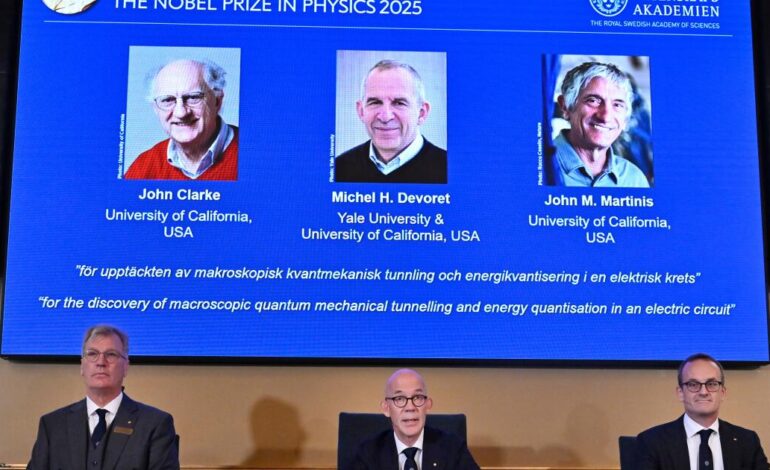UC Scientists Honored with Nobel Prize for Quantum Computing Breakthroughs

Three scientists from the University of California have been awarded the Nobel Prize in Physics for their groundbreaking research in quantum computing. John Clarke, Michel H. Devoret, and John M. Martinis received the prestigious honor on October 3, 2025, for their contributions to understanding quantum tunneling, a phenomenon that enhances digital communications and computing.
Impact of Their Research
Clarke, who conducted his research at the University of California, Berkeley, commented on the significance of their work, stating that advancements in quantum mechanics have already permeated everyday technology. Speaking via cellphone, he noted, “One of the underlying reasons that cellphones work is because of all this work.” Devoret, associated with both Yale and the University of California, Santa Barbara, and Martinis, based at the University of California, Santa Barbara, collaborated closely in this field.
In a telephone interview with the Associated Press, Clarke expressed his surprise at receiving the award, saying, “It had never occurred to me, ever, that I would win the Nobel Prize.” This achievement spotlights the lasting influence of their research, which dates back to the mid-1980s, where they explored the complexities of quantum mechanics and its potential applications.
Understanding Quantum Mechanics
The research conducted by these physicists is a significant advancement in the century-old field of quantum mechanics, which deals with the peculiar behaviors of subatomic particles. This area of study reveals phenomena where particles can exist in multiple states simultaneously, challenging traditional concepts of physics. According to Jonathan Bagger, CEO of the American Physical Society, their findings translate these microscopic interactions into practical applications that can revolutionize technology.
Quantum computing stands out as a primary application of their work, with implications extending to quantum sensors and cryptography. Mark Pearce, a professor of astrophysics and a member of the Nobel Physics Committee, highlighted the potential for these technologies to provide extremely sensitive measurements and secure communication methods. He stated that while quantum computing is a prominent use of their research, it also paves the way for future innovations in various fields.
Clarke noted, “In some ways, this is the basis of quantum computing.” He acknowledged that while the exact trajectory of their work’s impact remains unclear, it lays essential groundwork for future developments.
Both Bagger and Richard Fitzgerald, editor-in-chief of Physics Today, emphasized that while the everyday use of cellphones may not directly rely on their specific breakthroughs, the influence of their research is evident in ultra-sensitive devices like magnetic resonance imaging (MRIs). Bagger explained, “Quantum mechanics is everywhere in everything we do, from cellphones to satellite communications.”
Reactions and Continuing Legacy
Clarke’s family shared his excitement, with his daughter being among the first to congratulate him on the morning of the announcement. Meanwhile, Martinis remained unaware of the news as he was still asleep at home when reporters reached out. His wife, Jean Martinis, explained their decision to prioritize sleep over staying up for the announcement, humorously adding, “He doesn’t like surprises.”
The Nobel Prize in Physics is awarded for the 119th time this year, following last year’s recognition of artificial intelligence pioneers John Hopfield and Geoffrey Hinton. The Nobel announcements continue with the chemistry prize scheduled for October 4, followed by literature on October 5, and the Nobel Peace Prize on October 6. The award ceremony will take place on December 10, commemorating the anniversary of the death of Alfred Nobel, the founder of the prizes.
This award not only carries significant prestige but also accompanies a monetary reward of 11 million Swedish kronor, approximately $1.2 million. The recognition of Clarke, Devoret, and Martinis underscores the ongoing relevance of quantum mechanics in shaping the future of technology.






